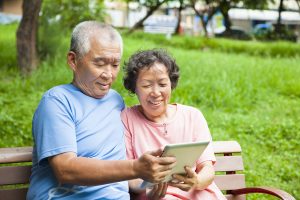If you’re like 75 percent of American adults who are online, you’re already using social network sites like Facebook, and you may be using other online tools to track activities. Now a new analysis of current evidence suggests that doctors and other providers using similar tools may help patients stay in touch, stay on target and stay in shape.
Diverse and innovative approaches that help people achieve a healthier weight could lead to thousands of fewer cases of cancer every year in the U.S. because excess body fat increases risk for 8 cancers, including those of the colorectum and breast (postmenopausal).
Published in the September issue of the journal Health Affairs, the researchers conducted an analysis of 12 studies to determine whether online social networking between health care providers and their overweight and obese patients can help with weight loss.
The analysis included almost 1900 patients, half using some social networking including combinations of web-based, mobile and telephone. Studies provided patients with tools that measured their physical activity, such as armbands or pedometers, along with direct communications through text messages, email, chat rooms or discussion forums. Some studies also used educational and behavioral tools like goal-setting and online journals.
For the participants getting the social networking services, the authors found a small, but significant change in Body Mass Index (BMI) compared to the control groups not receiving any networking service. Networking patients lowered their BMI on average by 0.66 percent – for a BMI of 35, that’s about a 1 1/2 pound weight loss more than non-networking patients.
How long the intervention lasted also affected participants’ weight loss. The studies lasting 6-12 months showed the most effectiveness. Six months’ length was too short and after 12 months, BMI did not improve for participants.
This study shows there may be limits to using social networking for weight loss, but as health care providers become more comfortable using these technologies, you may find yourself texting or uploading exercise information for your doctor on a regular basis.
If you are looking for support, a way to engage with others and information on how to eat smarter, move more and get lean, join AICR’s 12-week New American Plate Challenge.
Are you using social networks to help you get healthier or lose weight?





